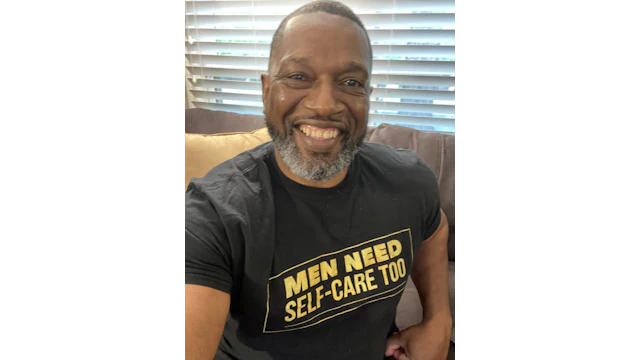It often feels like the words men and “self-care” are not compatible. Many of my childhood memories are of being encouraged by my father, uncles, male cousins, in fact most of the men in my life, to “man up.” This was foundational to my image of what it meant to be a man. I was encouraged not to express emotions or show vulnerability as it was considered a sign of weakness. I heard countless times, “Big boys don’t cry.” I even recall my high school football coach whose mantra for any one of us who sustained a physical injury was, “Rub some dirt on it.” Clearly this advice was not helpful. Its intent was to remind us that we were young men and as such, we should be tough and not succumb to pain or fatigue, physically or mentally.
The reality is that men do cry, men do experience emotional pain, and men do experience mental fatigue. In short, men need self-care, too. Self-care is simply the act of taking time to focus on yourself. Over six million men suffer from depression each year, and men die by suicide at four times the rate that women do. The challenge for men is often that being honest about mental or emotional pain and asking for professional help when you need it requires us to be vulnerable and that is something that is too often stigmatized for men.
Men can practice self-care in simple, effective ways. Here are four simple tips:
Physical Activity
Daily exercise produces stress relieving hormones that benefit overall health, both physically and mentally. But physical activity is not only relegated to the gym. It can be as simple as getting out of the house and taking a stroll around the neighborhood while taking in some sunshine. Most importantly, do something that you are willing to commit to.
Mindfulness
Mindfulness is about tuning into your thoughts, feelings, and bodily sensations with curiosity and acceptance. It is a way of giving yourself permission to acknowledge and give priority to what you are feeling in the moment. Think of it as a mental workout that strengthens your ability to focus, regulate emotions, and navigate life’s challenges. Mindfulness can help you to reduce stress and navigate life changes. Mindfulness also helps mental well-being by allowing men to be more emotionally open, as opposed to constantly fulfilling the “tough guy” stereotype.
Social Connection
Social connection is key to mental well-being. As humans, we are social beings. Spending time with loved ones and building meaningful relationships helps to form a sense of connectedness and belonging that can offer reassurance that none of us are alone. Make time for the people you care about, even if it is just for a quick phone call, text message, virtual chat, or coffee date.
It’s Okay to Talk
If you are experiencing symptoms like aggression, irritability, mood changes, sleep and appetite changes, sadness, numbness, or suicidal thoughts, these may be signs that it is time to ask for some help. That could mean calling or texting 988 to speak with a trained counselor. It could also mean therapy or medication if warranted. But it could also be as simple as reaching out to a trusted friend, family member, or co-worker and acknowledging that you are experiencing more than you are able to cope with right now, and you need help. There is no strength in suffering in silence and there is no shame in acknowledging that you need help.
Caring for yourself is a strong thing to do. You can learn more about how to build your personal resilience here.
